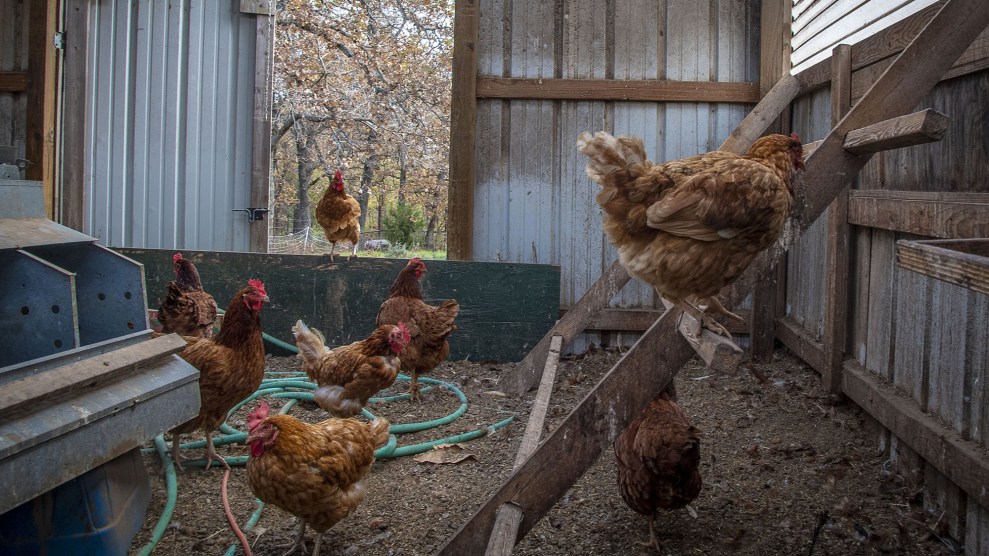
Free range chickens on a farm in Cromwell, Oklahoma. Preston Keres/ZUMA
This story was originally published by ProPublica.
By late 2016, many of the nation’s 25,000 chicken farmers said they had grown bitterly frustrated by the administration of President Barack Obama.
Under Obama, top officials had promised to help farmers by tightening regulations on meat processing companies, which for decades had been growing bigger and more powerful. The industry consolidation extended to beef, dairy and pork as well as poultry, but the Obama administration was particularly concerned about the effects on farmers who raise chickens on contract for giants such as Tyson Foods and Pilgrim’s Pride.
Farmers complained that they had been lured into the business with rosy profit projections only to discover that the processing companies—which they depend on for supplies of chicks and feed—could suddenly change their contract terms to impose additional costs or drop them for any reason.
By the time the Obama administration finally pushed through the rules meant to address these problems in December 2016, Donald Trump, a Republican, had won the White House, backed by many farmers who said they had been let down by Obama, a Democrat.
Now, some say their expectation that Trump would be different may have been misplaced.
Over the last two years, Trump appointees have not only reversed the regulations put in place at the end of Obama’s presidency, they have retreated from enforcing the preexisting rules. The Trump administration dissolved the office charged with policing meat companies for cheating and defrauding farmers. Fines for breaking the rules dropped to $243,850 in 2018, less than 10 percent of what they were five years earlier.
“The chicken company cost me my ability to feed my children and pay our bills,” said Tony Grigsby, a retired cop in Alabama who recently quit chicken farming. Grigsby identifies as a Republican and enthusiastically supported Trump, but he said he wished Trump hadn’t scrapped Obama’s regulations. “I hear the president saying he’s doing things for the American farmer,” he said, “but it’s almost like it’s only a certain percentage.”
The White House declined to respond to questions about its decisions related to the meat industry, and the USDA declined to provide an interview with the top enforcement official. A USDA spokesman said the agency “is committed to supporting the president’s commitment to reprioritize spending and redefine the proper role of the federal government.”
The National Chicken Council, which represents the big chicken companies, has cheered the Trump administration’s rollback of the proposed regulations, saying the rules would have cost the industry—and, by extension, consumers—billions of dollars.
“Companies have waiting lists of potential farmers that want to partner with them to raise birds,” Tom Super, a spokesman for the trade group, said.
The administration’s moves underscore its ties with the meat industry. One of the largest donations supporting Trump during the campaign was a $2 million super PAC contribution from a poultry magnate, and several industry stalwarts took positions with the Trump transition team or in the Agriculture Department.
The administration’s siding with big meat companies over small farmers is already becoming campaign fodder for Trump’s opponents. Bernie Sanders and Elizabeth Warren have vowed to restore the Obama-era regulations and dust off atrophied antitrust laws to break up big meat companies. The Center for American Progress, a liberal think tank, is promoting the creation of an independent agriculture regulator, akin to the Consumer Financial Protection Bureau.
Chicken farmers who considered themselves staunch Trump supporters say their worsening circumstances since he took office are making them reconsider their votes. Mike Weaver, a West Virginia farmer, said he gave up raising chickens this year after the company wanted him to waive his right to sue—something the Obama administration’s rules would have prevented.
“I made excuses for him for a while, thinking he’s going to eventually get a grasp on the dire situation small family farmers are in,” Weaver said of Trump. “It hasn’t happened yet. If it doesn’t happen by the next election, I’m going to tell everybody some of the promises he made were never kept and I don’t see it changing.”
The main law regulating meatpackers was passed almost a century ago after a Federal Trade Commission investigation found that five companies had a stranglehold over the country’s meat supply and used it to fix prices, crush competition and defraud farmers and consumers.
The Packers and Stockyards Act of 1921 prohibited meatpackers from engaging in unfair and deceptive practices, manipulating prices, creating monopolies or giving undue preference to particular people, businesses or places. The law’s scope expanded over the next several decades to apply to livestock dealers, live poultry dealers, swine contractors, and other related businesses.
Eventually, however, courts, the Justice Department, the FTC, and the USDA softened their stance on consolidation. From 1986 to 2016, the top four companies’ market share rose from 55 percent to 84 percent in beef processing, 33 percent to 66 percent in pork, and 34 percent to 50 percent in chicken, according to USDA data. Counting the fifth-largest chicken company, the top firms control 61 percent of the market.
The industry says consolidation has improved productivity, allowing the U.S. to grow more food using less land and labor.
But another upshot of these changes is that the five biggest chicken companies—Tyson Foods, Pilgrim’s Pride, Sanderson Farms, Perdue Farms, and Koch Foods—exert “such comprehensive control” over the contractors who raise chickens for them that the Small Business Administration’s inspector general said these farmers should no longer qualify as independent small businesses. (The SBA hasn’t decided whether to follow that recommendation.)
Chicken companies contract with local farmers to raise and care for birds for several weeks until they’re ready for slaughter. The farmers bear the cost of housing the birds, equipment, and fuel. The companies, in addition to delivering chicks and feed, rank the farmers based on how plump their birds get and pay accordingly. This so-called “tournament system” rewards the most efficient producers, the companies argue, but farmers say the companies control key variables, such as who receives the healthiest chicks and the most nutritious feed, and, thus, who comes out on top.
One clear indicator of companies’ growing leverage over farmers: Farmers’ average pay rose by just 2.5 cents a pound from 1988 to 2016, while the wholesale price of chicken increased by 17.4 cents a pound, data from the USDA and the National Chicken Council shows.
In the early years of the Obama administration, top officials visited farmers in Iowa, Alabama, and Wisconsin—places where the Tea Party backlash was giving Democrats trouble with white working-class voters—and promised help to those who said the system was rigged against them.
“This is a top priority for today’s Department of Justice,” Attorney General Eric Holder told the crowd in an auditorium at Alabama A&M University in May 2010.
Farmers at the Alabama meeting detailed how chicken companies dictated contract terms and how they were powerless to resist, even if the terms were financially ruinous.
“Either I sign it or I ain’t got no chickens,” Garry Staples from Steele, Alabama, said at the hearing. “Without any chickens, I can’t pay any bills. I can’t pay my mortgage because chicken houses are designed for one thing: grow chickens.”
Staples said he was risking his livelihood just to be there, since the companies were known to use the tournament system to punish farmers who spoke out. Some farmers read messages on behalf of others who were too afraid to come.
The Justice Department’s top antitrust enforcer, Christine Varney, told Staples she would have his back. “Mr. Staples, let me say, I fully expect you will not experience retaliation by virtue of your presence today,” Varney said at the hearing. “But if you do, you call me at this number because I want to know about it.” The audience clapped and cheered. (When Staples tried to call Varney a few years later, he discovered she’d left the Justice Department for a partnership at the law firm Cravath, Swaine & Moore. She declined to comment.)
Ultimately, the meetings and promises didn’t lead to action by the Justice Department. In 2012, the Antitrust Division issued a 24-page report summarizing farmers’ concerns but concluding that many, or possibly most, of them “fall outside the purview of the antitrust laws.”
The USDA, however, proposed regulations in June 2010 designed to address many of the chicken farmers’ chief complaints. The rules would clarify prohibited practices, such as retaliating against farmers and terminating their contracts without notice. They would make it easier for farmers to sue, without their having to show that companies were harming competition across the industry, an almost impossibly high bar to clear. And they would restrict chicken companies from using the tournament system to mislead farmers about their projected income or to favor some farmers over others by providing unequal quality of chicks and feed.
“The rules addressed fraud, bad faith, retaliation and denial of due process,” said Dudley Butler, a Mississippi lawyer who helped develop the new rules in the USDA during the Obama administration.
The meat industry opposed the proposed regulations and lobbied Congress to block them. Meatpackers spend more than $4 million a year on lobbying, and the top recipient of their campaign contributions in the 2014 House elections was Jack Kingston, a Georgia Republican who led the agriculture appropriations subcommittee. The House Appropriations Committee also included Steve Womack, an Arkansas Republican whose district is home to Tyson Foods, the biggest chicken company.
When annual funding bills made their way through Kingston’s and Womack’s panels, lawmakers inserted a prohibition against USDA staff spending any time to work on finishing the regulations. Republicans on the Appropriations Committee said the rules would “allow harmful government interference in the private market for the livestock and poultry industry.”
Spokespeople for Womack and Kingston didn’t answer requests for comment. Kingston retired from Congress in 2015 and became a lobbyist.
With Congress barring the USDA from working on the regulations, the Obama administration could not put them into effect. At a 2014 meeting with farmers who supported the regulations, Agriculture Secretary Tom Vilsack told them they’d been outgunned by the industry. “You don’t have enough horses,” Vilsack said, according to two people present: Joe Maxwell, executive director of the Organization for Competitive Markets, a populist advocacy group for farmers; and Chris Petersen, a hog farmer from Clear Lake, Iowa. Vilsack didn’t respond to requests for comment. (He’s now head of the U.S. Dairy Export Council, which did not have a position on the regulations.)
Just before Obama left office, Congress stopped preventing the USDA from working on the regulations (in part because of public outcry over a television segment by the comedian John Oliver). The Obama administration raced to finish the regulations before Trump’s inauguration.
In December 2016, the USDA released a watered-down version of its 2010 proposal. The agency published an interim final rule on making it easier for farmers to sue. The agency also proposed a rule spelling out deceptive practices and another against using the tournament system to treat farmers unequally. But under the legal process for implementing new regulations, these rules couldn’t take effect for several more months. That left them vulnerable to being changed by the incoming administration.
After doing away with the Obama administration’s interim final rule and proposed rules, the Trump administration says it will propose a new regulation this summer. The USDA has been holding talks with industry groups to discuss the new policy. Farmers and their advocates fear the new regulations could be even more favorable to big meat companies than the status quo, according to Steve Etka, who lobbies for small farmers. Some in the industry, though, say they hope the administration will ditch its rulemaking effort entirely.
“We’d love to see them do nothing,” Colin Woodall, a lobbyist for the National Cattlemen’s Beef Association, said. “The action the secretary took to stop this is exactly what we wanted. We believe the USDA’s efforts are better focused on implementing and enforcing the Packers and Stockyards Act as it exists.”
But that’s not happening either. The staff in the office responsible for enforcing the law has dwindled to 137, from 166 in 2010. In 2017, the most recent data available, the office finished 1,873 investigations, down from 2,588 in 2012. The office suspended five people and companies for violating the Packers and Stockyards Act in 2017, down from 34 in 2013.
The USDA declined to allow ProPublica to interview Stuart Frank, director of the Packers and Stockyards Division. In a statement, the department said compliance varies over time depending on economic conditions, and penalties depend on severity and the violator’s “ability to pay and stay in business.”
Agriculture Secretary Sonny Perdue also has eliminated the enforcement office as an independent administration within the USDA, moving it under the Agricultural Marketing Service, the branch of USDA whose primary mission is facilitating sales for big agriculture companies. In a memo, he described the reorganization as “Improving Industry Engagement.”
“That’s outrageous,” said Weaver, the West Virginia farmer who spoke at the 2010 Alabama hearing. “How’s the agency that supports the industry and helps them increase revenue going to put the guys out there to police those companies and make them do the right thing?”
Weaver started growing chickens 15 years ago, after retiring from being a special agent with the U.S. Fish and Wildlife Service. He bought a farm in Fort Seybert, sheltered between Shenandoah National Park and the George Washington National Forest, expecting that the income from his chicken houses would help him afford a little more land and supplement his retirement. Instead, he said, everything he earned from the chicken operation had to go back into new investments that the company required in order to keep receiving flocks to raise.
Weaver dedicated hundreds of hours to rallying support and contacting lawmakers about the Obama administration’s proposed regulations. “I can’t tell you how disappointed we were,” he said. “Obama bowed to industry like all politicians. They made all kinds of promises and nothing was done.”
Weaver said he thought Trump would be different. He wasn’t another politician, he was a businessman. He said he would end business as usual in Washington and make things fair for the little guy. That was a big reason why Weaver voted for Trump.
Last year, Weaver received a new contract from the company he grew for, Pilgrim’s Pride, a subsidiary of JBS, the world’s largest meat company. The new contract required farmers to drop all legal claims against the company and forbade them from participating in class-action lawsuits.
Weaver wouldn’t accept that, since he is part of a federal lawsuit in Oklahoma alleging that Pilgrim’s Pride, Koch Foods, Tyson Foods, Sanderson Farms, and Perdue Farms conspired to hurt farmers by fixing chicken prices. The companies said the farmers failed to demonstrate any illegal conduct. A judge has not yet ruled on whether the case can proceed.
The regulations proposed by the Obama administration would have prevented Pilgrim’s Pride from forcing Weaver to waive his litigation rights. But since those rules were blocked, Weaver was on his own.
Weaver crossed out the offending provisions and signed. Pilgrim’s Pride rejected it. A spokeswoman for JBS, which owns Pilgrim’s Pride, said farmers who opted out of the new contract could remain on the old contract. Weaver said he couldn’t afford to continue under the old contract, which paid less, so he had his last flock in January. He’s done with chicken farming.
“I miss it like a toothache,” he said.
But Weaver hasn’t given up on trying to get Trump’s attention. He wrote an open letter to Trump published on the website of Fox News, lamenting the decision to overturn the Obama administration’s regulations and asked Trump to uphold his campaign promises: “As farmers, with families who depend on us, we are dismayed by the move and we’re calling on President Trump to make good on his campaign pledge—to drain the swamp of big meat lobbyists who continue to cut bad deals that hurt rural economies and families.”
Weaver also made a personal appeal to Lara Trump, the president’s daughter-in-law. He met her at a July 2017 event in Washington with the U.S. Humane Society, since she is vocal about animal welfare. Weaver gave her a hat branded with his local association of chicken farmers and a note to the president. Lara Trump assured Weaver she would deliver the note, he said.
The Trump campaign, where Lara Trump is an adviser, didn’t answer requests for comment.
Weaver is still waiting to hear back from her, too.
ProPublica is a Pulitzer Prize-winning investigative newsroom. Sign up for The Big Story newsletter to receive stories like this one in your inbox.
















